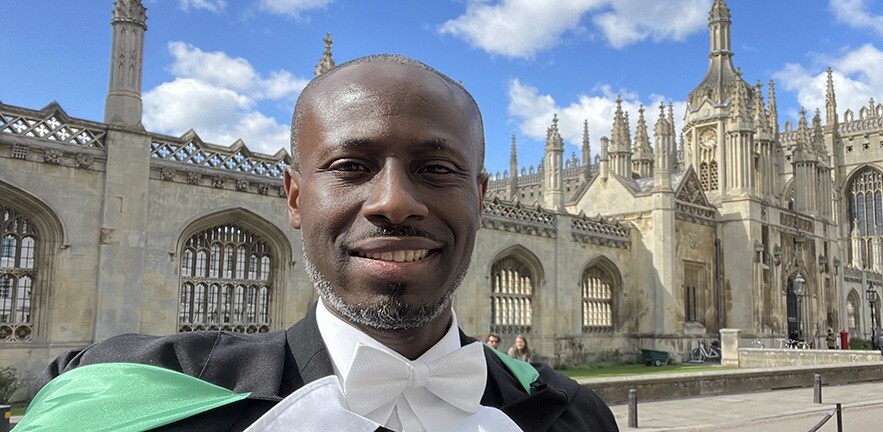For Black History Month this October, we caught up with Ayobami Akinyode Olunloyo, an Executive MBA graduate of Cambridge Judge Business School (EMBA 2018).
A native of Ibadan, Oyo State, Nigeria, Ayobami was named in 2020 to the “Best and Brightest” list among EMBA executive students by the business school publication Poets & Quants.
He currently works for the Sky broadcasting company in the UK, where he focuses on delivering trading insights, route-to-market strategy and optimising stakeholder delivery through relationships.
Ayobami reflects here on his personal and family journey, Nigeria’s political situation, Cambridge Judge Business School, and what Black History Month means to him:
Tell us about your career and personal life journey, including a little bit about your Nigerian family history
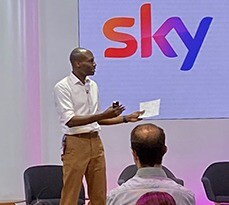
I have wonderful memories growing up as one of 8 siblings amongst which I hold the call sign “OO7” (signifying my position as seventh in birth order). Being amongst the youngest, I was privileged to have many trailblazers ahead of me who showed both what to and what not to do. The context of our household was like living under a cloud of academia and politics, being that my father had been a university lecturer before running for public office and being elected State Governor. Apart from the influence of older siblings, I often heard of the exploits of uncles who had attended Cornell, MIT and Harvard. So I naturally had big shoes to fill, however this positively directed me to always set my sights high.
Engineering, mathematics, literature, and music, especially classical and jazz, were usual conversation topics and would play a huge part in defining my world view. Fundamental to that view, however, is my Christian faith, from which I derive my personal values and rules of engagement with fellow humans. I began my working career in the UK defence sector after being headhunted by Thales on graduating from the University of Birmingham in 2001. I subsequently segued into the creative industries, my area of passion, and built a career and a business as a multimedia production expert. This ultimately led to pursuing my EMBA at Cambridge, after which I opted for my current commercial role within the senior leadership team at Sky UK. I am married to Laide and we have a teenage daughter, Dara.
How have your family’s interests, aspirations and motivations for a better Nigeria influenced your own?
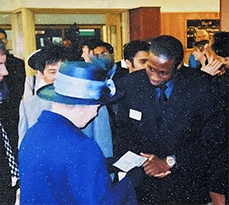
My political gene originates from a long line of actors, of which the most influential are my parents. My mum’s dad met HM Queen Elizabeth II in 1956 as a key Nigerian political figure, an honour I was to repeat 43 years later. My father, who incidentally also met the same Queen as an outstanding Commonwealth student, also went on to be a key political figure in Nigeria. Their examples were early indicators of the important linkage between politics and governance and how both directly affect the lives of citizens.
This understanding sowed a seed of public service in me, and not merely one of desire, but rather of responsibility. I am deeply grateful for the opportunities that I have had in life, especially in education, which I believe is one of the greatest investments a person can make in another, but I am well aware that those opportunities remain inaccessible to millions of Nigerians. That is what motivates me to strive for fairness, justice, and opportunity for all citizens regardless of ethnicity, creed, age, or gender.
Though my father’s time in office was cut short by a military coup, the values he and my mother taught us endure and beyond building on his legacy, my ambitions lie squarely in offering sacrificial, impactful, honest, and citizens focussed leadership to Nigerians. That is why I built upon my EMBA, a qualification in Public Leadership & Policy at the School of Politics, Policy, & Governance (SPPG) where I was honoured to be a valedictorian and the best graduating student.
Do you have any thoughts you would like to share on Nigeria’s current political situation, and the importance of good leadership?
Nigeria is not just Africa’s most populous nation, it holds within its own destiny the promise of Africa’s potential. If Nigeria rises, Africa rises; so what happens in Nigeria potentially has repercussions far beyond its own geographical expression. The singular cause of Nigeria’s currently attenuated development and growth lies in leadership. The nation has been sadly plagued by extremely poor leadership, which has bred ills such as government inefficiency, repeated policy failures, and corruption. The consequent lack of character, competence, and capacity that plagues all levels of government is the specific target of the SPPG’s mission – to develop a whole new political class of disruptive thinking politicians who will serve the Nigerian people fairly, justly, and competently in order to produce a nation of which all Nigerians and indeed Africans will be proud.
So, with the 2023 general elections on the horizon, Nigeria finds itself at a crossroads: the choice to retain the status quo of mediocrity at the highest levels of public service, or rather to break away and forge a new path. This choice can only be made by one set of stakeholders – “we the people” – and it can only be exercised through the right to vote. This is why Nigerians must come to understand, accept, and truly believe that our democracy is in our own hands. For too long, we have left politics and governance in the hands of some of the worst of us; it is time for well-meaning Nigerians everywhere to rise up to the challenge of running for office and voting for candidates with the requisite character, competence, and capacity to take Nigeria to its rightful place within the League of Nations. This is how we institute good leadership in our political space; this is how we move our nation forward as one for all.
Why did you decide to study for an EMBA at Cambridge Judge and how has it impacted your career?
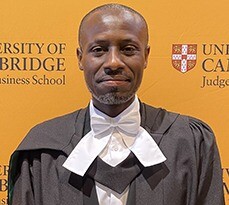
At a critical point in my career, I knew it was time to validate the skills, expertise, and experience that I had gained over many years. I wanted to compare myself to the best in the world and see how I measured up, hence I applied to only one school – CJBS. I also wanted to upgrade my academic qualifications with a second degree having completed a straight Masters in Engineering. The Cambridge experience, and specifically via Cambridge Judge Business School, was life-changing. It truly does what it says on the tin. To have access to so many incredibly talented characters, amongst the student body and faculty, is a blessing of incalculable proportions. It takes being a part of it to truly understand the power of the Cambridge network, and though my first allegiance is to my faith in God, He used Cambridge to play a direct role in securing my current position at Sky. The ability to return every year for electives, free of charge for life, remains one of the greatest selling points of the Cambridge Executive MBA, and I intend to take every advantage of it to continually develop myself as a leader and a professional.
This year’s theme for Black History Month is Time for Change: Actions Not Words. What does Black History Month mean to you? And what changes or actions would you like to see?
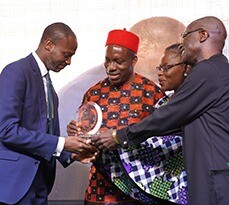
The theme ‘Time for Change: Actions Not Words’ resonates with me strongly, particularly having just visited Nigeria. I returned with a very important document – my Permanent Voters Card, widely referred to as a ‘PVC’. Without this coveted identifier, a Nigerian is unable to vote in elections, is essentially relegated to ‘words’, and decisively excluded from the ability to take direct ‘action’ in choosing the nation’s next leaders. Armed with my PVC, I will be in Nigeria by God’s grace in February 2023 to have my say, by acting and casting my vote. To not do this, for me, would be tantamount to a dereliction of duty. Therefore, from my perspective, Black History Month is not a time to look back but one to look forward.
I ask myself what could be, not what was or should have been. I choose to look ahead to my own contributions, and those of my fellow citizens, and how those collective efforts can move individual and our collective destiny forward. If Black History reminds us of moments of injustice or acts of unfairness, then let us correct them; if it reminds us of times of triumph and glory, then let us celebrate them; but whatever it does, let us remain committed to working together as decent human beings, black or otherwise, to secure a prosperous, fair, and just future for all. This is the change I would like to see. This is the change the world needs.


